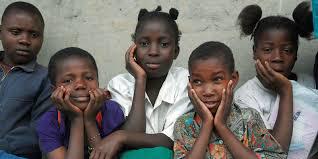
Clinging to her toy dog, 18-month-old Clemence Mokbem stares ahead as nurses rush past to tend to crying babies in the hot, overcrowded intensive care ward in a Bangui hospital.
The toddler was taken to the main children's hospital in Central African Republic's capital by her teenage mother Anita, after successive bouts of malaria led to fever and weight loss.
"I fed her but she didn't eat - she cried all night," the 16-year-old told the Thomson Reuters Foundation at the hospital.
"She's had malaria a few times, but not like that."
Despite suffering from malnutrition, diarrhea and vomiting, Clemence is starting to regain her strength, having arrived at the hospital's nutrition unit weighing only 5 kg (11 lb).
Across the Central African Republic, up to 30 children die every day due to malnutrition, according to aid organization Action Against Hunger (ACF), which runs the unit.
Three years of conflict have damaged many health facilities or left them empty and disrupted farming in a country where three in four people rely on agriculture to survive.
Half of the population do not have enough food - a number which has doubled since last year, according to the United Nations World Food Programme (WFP), which said the hunger levels across the Central African Republic were "staggeringly high".
"Malnutrition is a silent and a forgotten crisis affecting children in the Central African Republic," said Celestin Traore of the U.N. children's agency (UNICEF), adding that four in 10 children across the country suffer from chronic malnutrition.
The election of a new president in February raised hopes of stability for Central African's population of 4.6 million, but there is little sign of a downturn in the number of people suffering from malnutrition, said ACF country head Eric Besse.
"We are saving lives ... but to change things we can't think of malnutrition just as a health problem," Besse said.
"There are still stakeholders fighting or just looting and attacking villages to gain terrain. People are still displaced every day, and half of the population are still starving."
Source: Reuters
 FR
FR EN
EN AR
AR








